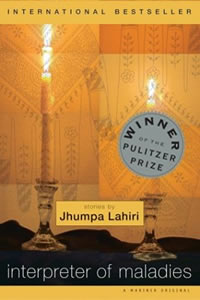
('Odd Man Out' © Jessie Pearl, 2009)
A FOREIGN WORLD
by SHAFIQAH SAMARASAM
Jhumpa Lahiri may not be a household name but for people who, like me, live in a foreign country, her delicately heart-warming, Pulitzer Prize-winning short stories evoke distant lands, far from home. She is a sophisticated writer, weaving her stories in ways that are simple yet depict different lives in such a fresh, unique way.
In my opinion, Interpreter of Maladies and Unaccustomed Earth will stand the test of time as two of the greatest modern compilations of short stories. Those who, like me, leave home in hope of a better life in a new country will find themselves drawn to Lahiri’s work; reading one of these collections is like stumbling upon a piece of home.
 Indian culture dictates that one is to have a nickname: a term of affection used to show love for someone. ‘Jhumpa’ was the nickname given to Nilanjana Sudeshna Lahiri. Born and growing up far from her cultural homeland, her migrant parents instilled in her a love for their home country and her Indian heritage. This is why I feel connected to her. Her stories convey what it would have been like for my ancestors to take the decision to leave their magical homeland of India in search of an unknown future across the sea. Lahiri’s craft travels around the different continents to which she belonged: Asia, Europe and especially North America, where she has spent a big part of her life.
Indian culture dictates that one is to have a nickname: a term of affection used to show love for someone. ‘Jhumpa’ was the nickname given to Nilanjana Sudeshna Lahiri. Born and growing up far from her cultural homeland, her migrant parents instilled in her a love for their home country and her Indian heritage. This is why I feel connected to her. Her stories convey what it would have been like for my ancestors to take the decision to leave their magical homeland of India in search of an unknown future across the sea. Lahiri’s craft travels around the different continents to which she belonged: Asia, Europe and especially North America, where she has spent a big part of her life.
Growing up in a multiracial country, I was bewildered as to how I should label myself. In my country, it is common to identify ourselves by a single aspect of our lives, leaving the other facets of our existence unacknowledged. I was unsure where I belonged. I didn’t know what I was, and there was no way I could express myself, until I discovered a love of writing and reading, and that was when I found Lahiri.
Truth be told, I found it hard to find a connection with many writers, and at times I wondered if I was the problem, but Lahiri drew me in. Her euphoric yet simple way of telling a story comforted me. Her work revolves around the idea of being ‘foreign’, repeating the same elements in different ways. That is why it resonates powerfully in the minds of readers, especially those living in a foreign country, as she places the untold stories of foreign lives in the limelight. Lahiri’s depiction of lives that are in no way straightforward, or even ‘normal’, are set apart by her dramatisation, introducing us to tales to which we can all relate. Lahiri presents us with stories of unimportant individuals, told in the simplest way possible, tinged with the anxiety, conflict and awkwardness of being in a new world.
 In ‘A Temporary Matter’ an estranged couple enduring a prolonged blackout find themselves opening up to each other and revealing the hidden thoughts lingering in their minds. What at first is seen to be merely alienation from each other after a disagreement, turns out to be a far deeper malady stemming from the loss of their baby. In the darkness of the power cut, they are forced to confront their problems and attempt reconciliation, but finally, ‘They weep for the things they now knew’. Lahiri depicts their attempt, and eventual failure, so skilfully that it touched me despite never having experienced those emotions myself.
In ‘A Temporary Matter’ an estranged couple enduring a prolonged blackout find themselves opening up to each other and revealing the hidden thoughts lingering in their minds. What at first is seen to be merely alienation from each other after a disagreement, turns out to be a far deeper malady stemming from the loss of their baby. In the darkness of the power cut, they are forced to confront their problems and attempt reconciliation, but finally, ‘They weep for the things they now knew’. Lahiri depicts their attempt, and eventual failure, so skilfully that it touched me despite never having experienced those emotions myself.
She doesn’t solely reveal the sweetness of the story, nor does she only reveal the agony of the characters’ circumstances. The story captures the regret, the values and the closure attained in ‘getting to the end of the rainbow’, experienced by those who seek a new life in a foreign land. It also gives an insight into how, at times, we foreigners choose to forget about our homeland:
Shukumar hadn’t spent as much time in India as Shoba had. His parents, who settled in New Hampshire, used to go back without him. The first time he’d gone as an infant he’d nearly died of amoebic dysentery. His father, a nervous type, was afraid to take him again, in case something were to happen, and left him with his aunt and uncle in Concord. As a teenager he preferred sailing camp or scooping ice cream during the summers to going to Calcutta. It wasn’t until after his father died, in his last year of college, that the country began to interest him, and he studied its history from course books as if it were any other subject. He wished now that he had his own childhood story of India.
‘Unaccustomed Earth’ reveals the divergence of the different generations of emigres as they adapt to their new country. A first-generation widower, unhappy with his traditional way of life in the past, tries to embark on a path enriched by the newfound culture of the West, but his day-to-day life still hints at his past culture. This intrigues his grandson, who, despite being born in America, admires the Indian habits and mannerisms of his grandfather.
‘Unaccustomed Earth’ hit home hard for me as I found myself reading a story that reflected my life in every way possible, especially on the relationship between the grandfather and his grandchildren. I found myself remembering the foreign habits of my own grandfather, which never pleased me. I realised how significant this was only at the very end of his long life.
Jhumpa Lahiri’s magnificent stories will echo in the lives of many foreign people because of the strength of her portrayal of their lives. Reflecting this, she received the National Medal of Arts and Humanities, presented by President Obama, in recognition of her significant contribution to the humanities and American literature. Through her quiet but powerful voice, Lahiri presents a clear picture of lives lived alongside foreign people in a foreign country, uncertain and strange but at the same time familiar. It is the beat of my life.
~
 Shafiqah Samarasam is an aspiring twenty-year-old writer from Malaysia. She has received several accolades in the few years she has been a writer, and is in the midst of writing her first novel.
Shafiqah Samarasam is an aspiring twenty-year-old writer from Malaysia. She has received several accolades in the few years she has been a writer, and is in the midst of writing her first novel.

